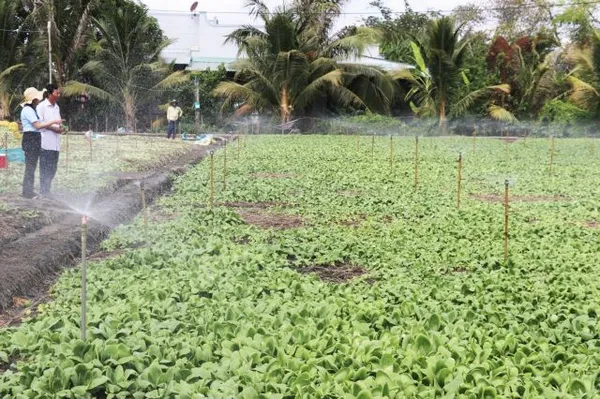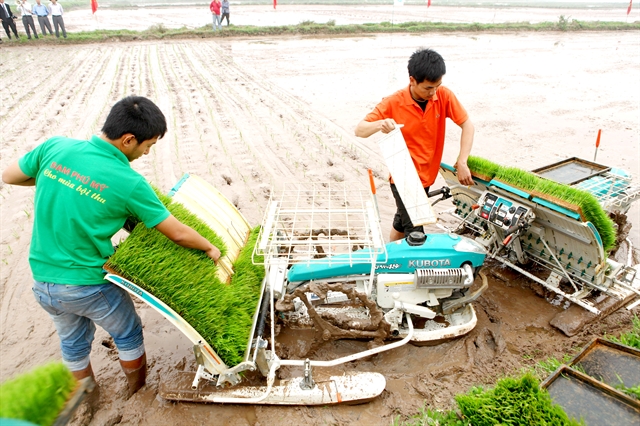 Society
Society

 |
| In order to encourage farmers and cooperatives to actively apply mechanisation in agricultural production, Hà Nội’s agriculture sector has organised the "Good Crop Transplanter Operator of 2024" contest. Photo courtesy of the Hà Nội Agricultural Extension Centre |
HÀ NỘI - In recent years, Hà Nội's agriculture sector has promoted synchronous mechanisation in rice production and formed many quality commodity rice production areas, on a concentrated scale, aimed at export.
According to the data from the Hà Nội Agricultural Extension Centre, Hà Nội currently has an annual rice growing area of about 160,000 hectares, and is one of the provinces and cities with a large rice growing area in the north.
In order to encourage farmers and cooperatives to actively apply mechanisation in agricultural production, especially synchronous mechanisation in rice production, on June 26, in Nam Phong Commune, Phú Xuyên District, Hà Nội's Department of Agriculture and Rural Development organised the "Good Crop Transplanter Operator of 2024" contest.
Its aim is to create a platform for farmers to exchange their knowledge and learn from others’ experience and new technical advances, contributing to agricultural productivity and agricultural product quality improvement, as well as to sustainable agricultural development.
According to Vũ Thị Hương, the Director of the Hà Nội Agricultural Extension Centre, the "Good Crop Transplanter Operator of 2024" contest has ten teams from different districts such as Phú Xuyên, Ứng Hòa, Thường Tín, etc.
Each team consists of five people participating in operating rice transplanters on an area of 1,800 square metres, equivalent to five acres. The organising committee selected rice varieties based on needs, soil, and local farming practices and provided seedling trays for transplanters for each competing team.
During the competition, each team must ensure that they follow the judges' scoring criteria such as the uniformity between rows of transplanted rice (the distance between rice clusters); the precision ratio of transplanted rice clusters; the planting depth and the completion time.
The 50 contestants are all farmers directly involved in agricultural production. They have deep understanding of science and technology, a lot of creative farming work experience and are exemplary faces representing hundreds of diligent and creative farmers in Hà Nội City.
Nguyễn Văn Thắng from Nam Phong Commune said: "I learned about this contest through information from the Hà Nội Agricultural Extension Centre.
"This year, Nam Phong Commune was chosen as the pilot commune to apply the machine transplanting model, promising to increase productivity and rice yield. Through this contest, I hope this model will be further replicated in agricultural production in Hà Nội."
Nguyễn Mạnh Phương, Deputy Director of the city's Department of Agriculture and Rural Development added: "The contest provides a chance for farmers to directly experience machine planting, thereby helping them see the optimal effectiveness of this method, which is liberating labour, reducing costs, increasing production efficiency and protecting the environment. The contest also gives farmers access to new science and technology, thereby gradually changing their production methods.
"For the city’s agriculture sector, this brings about a solution to gradually remove the difficulties of labour shortage for agricultural production in rural areas, promoting mechanisation to become a key factor in Hà Nội's agricultural production."
Phương also said: "Recently, Hà Nội's agriculture sector has focused on supporting and encouraging farmers to apply synchronous mechanisation in rice production, with priority given to the mechanisation of sowing and transplanting.
"In addition, the city's agriculture sector also supports farmers in bringing new rice varieties with high yield, good quality, and adaptation to climate change into production, increasing the proportion of high-quality rice to meet consumer expectations and aim for export."
In the future, the agriculture sector will step up propaganda, promotion, building and strengthening chains of rice production and consumption, promoting trade and product consumption to attract domestic and international investors to sign consumption contracts with cooperatives, contributing to improving the value of rice grains, as well as increasing the income of farmers in Hà Nội.
The city's agriculture sector also identified this as one of the key tasks to increase economic value from rice growing, pulling farmers back to the fields, ensuring food security and enhancing the city's rice brand.
In addition, the city’s agriculture sector will continue to bring high-quality rice varieties into production. In particular, in the period of 2021-2025, Hà Nội strives to have its high-quality rice seed structure reach over 80 per cent of the cultivated area, forming three to five domestic and rice export chains. -- VNS

.jpg)


